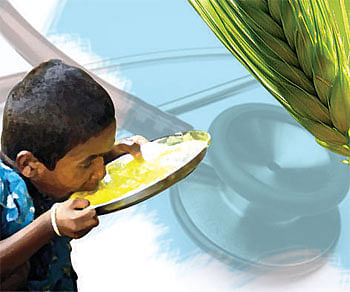Concerted efforts required to halt the epidemic of malnutrition
While releasing a comprehensive report on hunger and malnutrition recently, prime minister Manmohan Singh said that ''despite impressive growth in the Gross Domestic Produce (GDP), the level of malnutrition is unacceptable'' and ‘it is a national ‘shame’.

The report found that among children under the age of five across six states in north India 42 per cent are underweight, and 59 per cent of them suffer for stunted growth.
Besides being a national shame, it is a severe indictment on the ongoing economic and social policies of the government that has caused sub Saharan condition in several parts of India. The national shame is the failure of the political leadership that indicates insensitivity of our ruling class to address this crisis.
The Food Security Bill tabled in Parliament targets to reduce hunger and malnutrition by providing wheat and rice at cheaper rates to about 60 per cent of the population.
However, the poor cannot just live eating chappatis or rice. This may meet the requirement of carbohydrates, but the body needs other micronutrients and proteins.
This is available through consumption of fruits, vegetables and animal protein like milk or eggs and meat. With double-digit inflation afflicting the economy, these products are beyond the reach of the poor.
Even the middle class families are not in a position to afford them, forcing them to join the ranks of malnourished.
The irony is that India ranks the second largest producer of milk and vegetables in the world, but a majority of the citizens are unable to consume them due to lack of purchasing power. As a consequence of successful horticultural mission, we have subsidised the production of high value crops like grapes and pomegranates. Most of these products are exported at the cost of depriving local people of decent nutrient-rich food. This has accelerated malnutrition among the populace.
The change in food habits even in the remote regions in India is very drastic, replacing traditional food systems with the processed product of multinational food companies.
These are not only nutrient deficient, but they have adverse impact on health. Even though these are more expensive, the people are lured to buy them due to deceitful advertising.
The neo liberal agenda implemented by different political regimes over past two decades has contributed a great deal to accelerating the problem. The devastation of rural areas and agriculture and the heightened migration of people to urban areas are bound to increase the number of malnourished people in the country.
Ad hoc approach
The piece-meal solution implemented by the government to address the issue through Integrated Child Development Scheme (ICDS) is a pro-active step. Nevertheless, the insignificant financial allocation, tardy implementation and failure to reach to the needy in remote regions indicate the lack of commitment by the ruling establishment both at the Central and state levels.
In midst of this dismal scenario, the launching of the Citizens Alliance Against Malnutrition in 2004 under the leadership of Sachin Pilot and other young Members of Parliament cutting across party lines shows that younger generation of law makers are eager to address the issue.
They have met the prime minister to update the government on the ground level realities of malnutrition after visiting different states. But it will be too naïve to imagine that the prime minister is not aware of the gravity of the situation. Both he and the deputy chairman of the Planning Commission, Montek Singh Ahluwalia need no briefings on this issue. Their craze for chasing the double-digit GDP growth and the benefits trickling down to the poorest has met with dismal failure. The Food and Agricultural Organisation, the Human Development Index, the Global Huger Index and the National Family Health Surveys have all repeatedly revealed the prevalence of acute malnutrition in the country, both in rural and in urban areas.
Rather than taking immediate steps to rectify this deep-rooted malaise, they have adopted diagnostically opposite path in which the health budget has been reduced to about one per cent of GDP, as well as cutting down on welfare and educational schemes that has direct impact on reducing the cases of malnutrition.
Obviously, the political leaders have endorsed the advice of economists to leave the issue to be tackled by market forces. In order to implement this market driven strategy, they have resorted to bio fortification of food supplied through ICDS with the aid of corporate sector.
They are also eager to find technical solution to this socio economic problem. They advocate eradication of malnutrition through genetically modified (GM) golden rice and other GM crops.
For our ruling class, the epidemic of malnutrition provides a great economic opportunity! They are willing to surrender the moral and ethical values at the altar of ‘market God’. This shows their insensitivity to human suffering.
In order to arrest the spread of the epidemic of malnutrition, the country needs to gear itself towards launching an integrated campaign, using the synergies of different sections in the society. Food and nutritional security should become the foundations on which the goal of development should be built.
Deccan Herald is on WhatsApp Channels| Join now for Breaking News & Editor's Picks